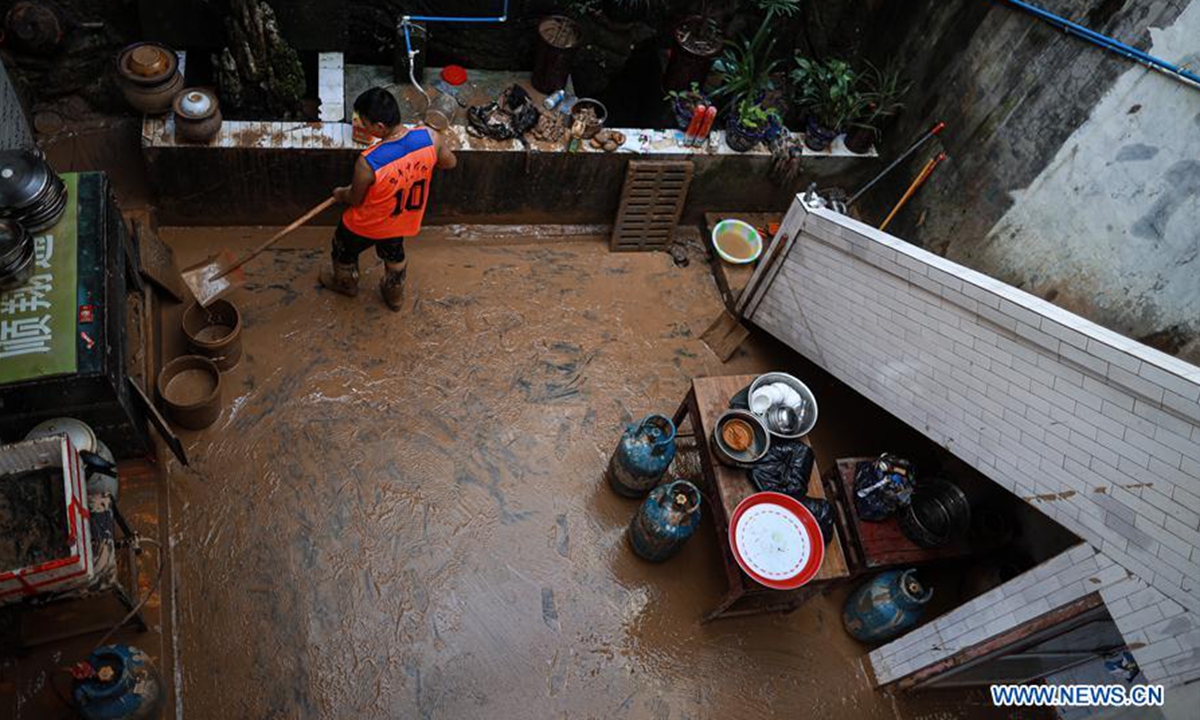Nation’s GDP predicted to grow 1-3% despite floods and pandemic
By Yin Yeping Source:Global Times Published: 2020/7/5 19:18:40
China’s GDP predicted to grow 1-3% despite floods and pandemic

A resident cleans silt at his home in Bifeng Town of Zheng'an County in Zunyi, southwest China's Guizhou Province, June 13, 2020. Rain-triggered floods have affected more than 700,000 people in southwest China's Guizhou Province, with 29,500 individuals temporarily evacuated, authorities said Saturday. (Xinhua/Liu Xu)
The floods hitting southern China is casting doubts on whether the Chinese economy would revive as fast as widely expected, although Chinese experts are upbeat that the economy will achieve positive growth of 1-3 percent over 2019.
China's Ministry of Water Resources Saturday raised the flooding emergency response to Level three from Level two. As of Friday, flooding has occurred in 26 Chinese provinces, affecting 1,560 hectares of crops, leading to economic losses of approximately 41.64 billion ($5.80 billion) yuan, according to media reports.
But experts have said the floods will have very limited impact on the overall GDP, given the country's monsoon rainy season is often temporary.
"In China, floods and droughts put a major strain on the production of agricultural and sideline products; however, the agriculture sector accounts for only 8 percent of the overall economy; and now that wheat has been harvested," said Cao Heping, a professor of economics at Peking University, on Sunday.
Tian Yun, vice director of the Beijing Economic Operation Association, told the Global Times that the impacts of seasonal flooding on China's economy will be both short-term and regional.
"China has experienced similar situations before, and the rainy season will pass in August, so the effect on GDP growth would be negative 0.1 percent, if anything," Tian said.
Compared with the floods, the impact of the coronavirus pandemic on the economy will be much heavier. As of press time, there are 11.2 million confirmed cases of COVID-19 around the world, with a confirmed death toll of more than 531,000, according to data from John Hopkins University.
Major difficulties on the economy have been caused by the cancellation of a large number of overseas orders, analysts said.
"The COVID-19 pandemic will hit the country's GDP growth rate this year by about 4-5 percentage points, from the 5.5 percent as originally expected in the beginning of the year, to around one percent," said Tian.
Cao from Peking University is more optimistic on the country's economic growth, with a prediction of 1-3 percent growth this year.
"Consumption that was not realized in the first half of the year will be completed in the second half, and if relevant government supportive policies are put in place, GDP growth is likely to be even higher than 3 percent," Cao said.